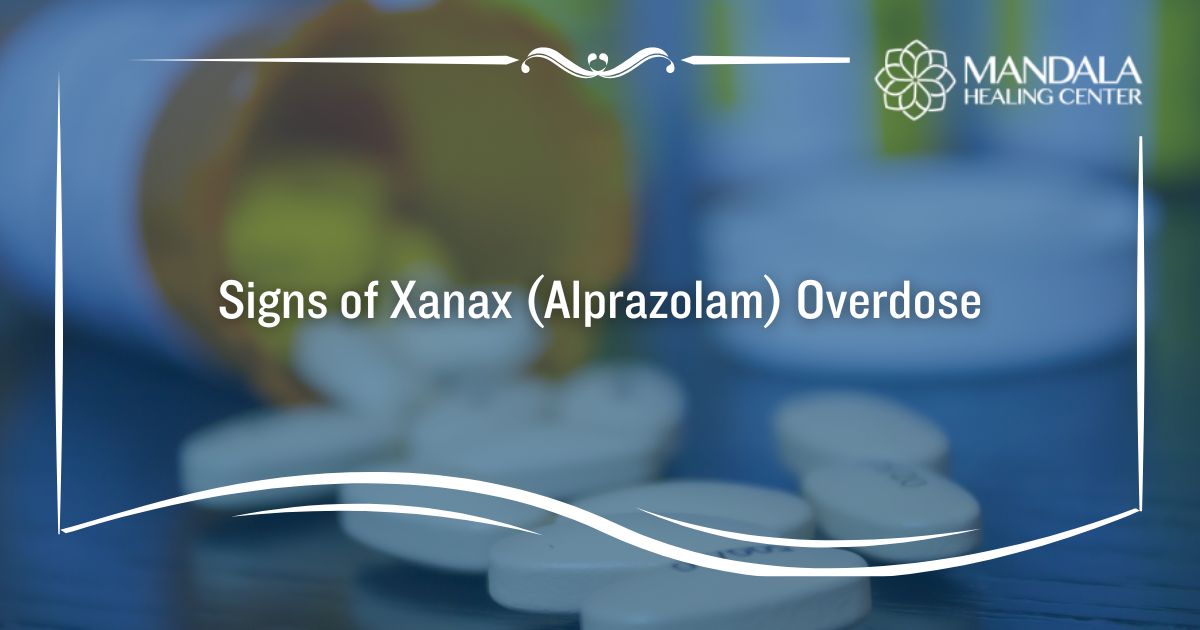Xanax is the brand name for a prescription benzodiazepine known as alprazolam. Medical professionals prescribe Xanax to treat anxiety conditions like panic disorder and seizures.[1] While it has legitimate medical uses, misuse of alprazolam can quickly lead to addiction.
If you or a loved one abuse Xanax, you are at an increased risk of experiencing an overdose. Addiction leads to tolerance, which means you will need to use larger doses to experience the desired effect. Unfortunately, taking high doses of Xanax can lead to a life-threatening overdose.
The symptoms of a Xanax overdose may include slowed or shallow breathing, lightheadedness, loss of balance, gurgling noises, and more.[2] Your likelihood of overdosing on Xanax is higher if you are mixing it with alcohol or opioids. If you believe someone is overdosing on alprazolam, contact 911 immediately.
In this article, you will learn:
- What is Xanax
- What are the signs of Xanax abuse
- Can you overdose on alprazolam
- What are the signs of Xanax overdose
What is Xanax (Alprazolam)?
Xanax is a benzodiazepine that is also referred to as alprazolam. It is considered a central nervous system (CNS) depressant because it slows down activity in the brain. It also affects gamma-aminobutyric acid (GABA) to induce feelings of calmness.
The side effects of Xanax may include:[1]
- Dizziness and drowsiness
- Lightheadedness
- Headaches
- Tiredness or fatigue
- Irritability
- Talkativeness
- Dry mouth or increased salivation
- Nausea and vomiting
- Constipation
- Changes in sex drive or ability
- Changes in appetite and weight
- Trouble urinating
- Joint pain
While Xanax can treat anxiety and seizures, it is also habit-forming. According to the National Library of Medicine, 17.2% of benzodiazepine use is considered abuse.[3] In other words, a large percentage of people abuse substances like Xanax.
What are the Signs of Xanax Addiction?
If you or a loved one regularly misuses Xanax, you might be wondering how to tell if you are suffering from addiction.
The signs and symptoms of Xanax addiction may include:
- Being unable to control the amount of Xanax you use
- Desiring to quit or cut back on your Xanax use and being unsuccessful
- Losing interest in previously enjoyed activities because of Xanax use
- Using Xanax in a manner other than prescribed
- Experiencing urges or cravings to abuse Xanax
- Combining Xanax with other substances to increase the effects
- Continuing to use Xanax despite facing relationship and social problems
- Using Xanax even though it is causing physical or mental health issues
- Getting into risky situations when you use Xanax
- Needing to increase your dose of Xanax to experience the desired effect
- Dealing with withdrawal symptoms when you stop using Xanax
If you are struggling with Xanax addiction, you are more likely to experience an overdose. You need to be especially careful if you combine Xanax with other substances like alcohol or opioids. Thankfully, addiction treatment programs can help you recover from Xanax addiction before you experience a benzodiazepine overdose.
Can You Overdose on Xanax?
In 2022, there were 10,964 benzodiazepine overdose deaths.[4] Xanax is the most commonly abused benzodiazepine, which makes it likely that it was involved in most of these deaths.
In other words, yes, you can overdose on Xanax. While the maximum dose of Xanax is 4 mg daily, it would take more than this to experience fatal effects. That said, if you combine Xanax with other substances, you could overdose on smaller amounts.
People older than age 65 are more vulnerable to Xanax overdoses because they are more sensitive to the drug’s effects. Additionally, if you suffer from metabolic, kidney, or liver issues, you might be more susceptible to an overdose.
What are the Signs of Xanax Overdose?
If someone you love regularly abuses Xanax, they need to seek Xanax addiction treatment. Without help, they are at risk of experiencing an overdose.
The signs and symptoms of a Xanax overdose may include:[2]
- Slowed or shallow breathing
- Lightheadedness
- Floppy limbs
- Extremely low heart rate and blood pressure
- Blue tint to fingernails and lips
- Choking or gurgling noises
- Confusion and balance issues
- Fainting and unresponsiveness
- Coma
While medications like Narcan (naloxone) cannot reverse a Xanax overdose, you should always call 911 for help. Paramedics can provide lifesaving treatments to prevent your loved one from dying during a benzodiazepine overdose. Once they have been treated, they can be transferred into a drug rehab program.
Find Help for Xanax Abuse and Addiction
If you or a loved one suffers from Xanax addiction, it’s time to seek professional help. At the Mandala Healing Center, we offer evidence-based and individualized treatment, ensuring our clients get the care they need.
Contact us today for more information on our Xanax rehab program and how to begin the admissions process.
References:
- Medline Plus: Alprazolam
- Medscape: Benzodiazepine Toxicity
- The National Library of Medicine (NLM): Benzodiazepine Use and Misuse Among Adults in the United States
- The National Institute on Drug Abuse (NIDA): Drug Overdose Deaths












